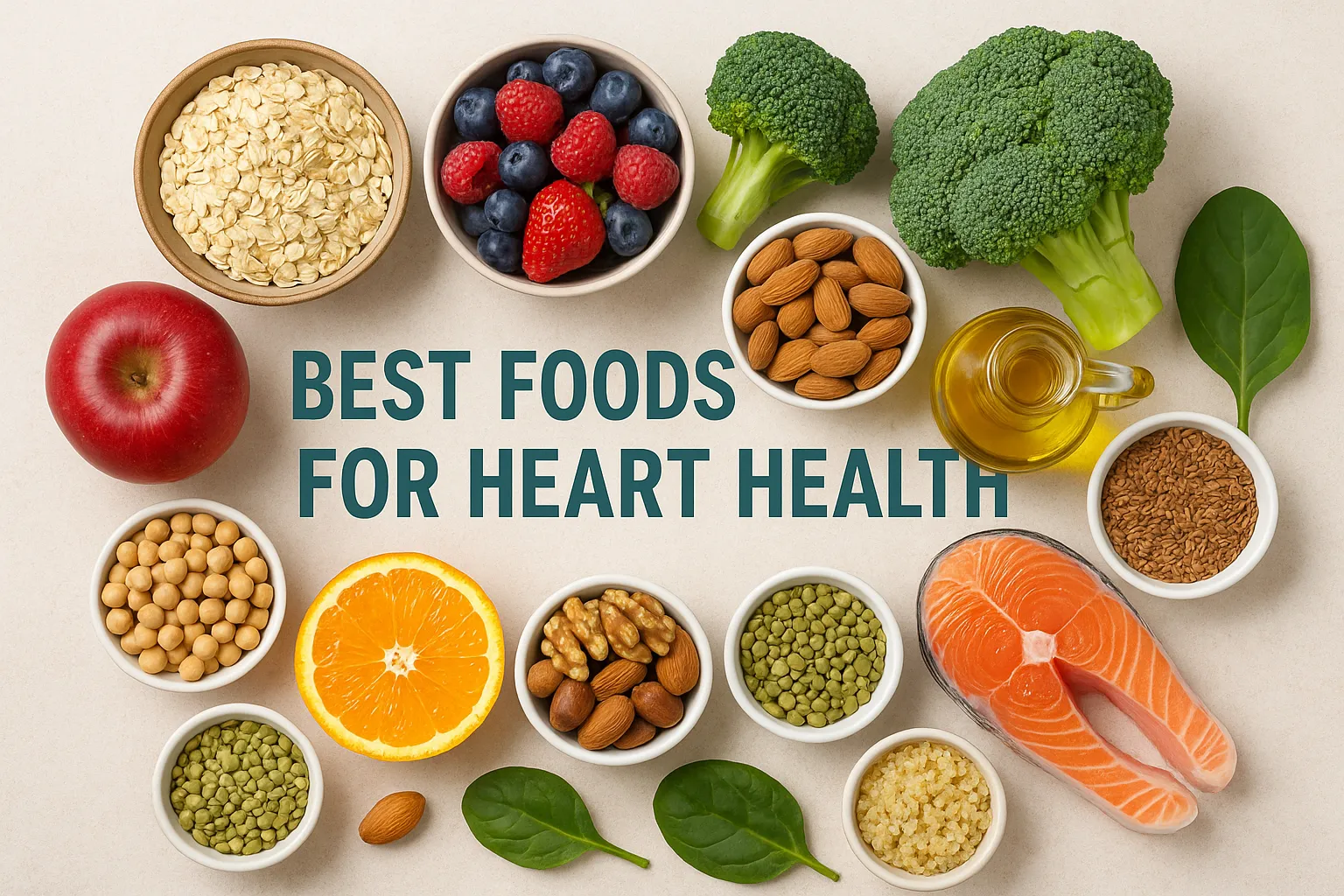Best Foods for Heart Health
Heart health is one of the most important aspects of overall well-being. A strong cardiovascular system helps regulate blood pressure, reduces the risk of heart disease, and ensures that oxygen and nutrients reach every part of the body. One of the best ways to support your heart is through the food you eat. In this article, we will explore the best foods for heart health, how they work, and why incorporating them into your daily diet can make a life-changing difference.

Whole Grains: The Foundation of Heart-Healthy Diets
Whole grains are rich in fiber, vitamins, and minerals that support cardiovascular function. Foods like oats, quinoa, brown rice, and whole wheat bread help lower cholesterol and stabilize blood sugar levels. Consuming these foods regularly is associated with a lower risk of heart disease.
Unlike refined grains, which lose essential nutrients during processing, whole grains retain their bran and germ layers. These layers are packed with antioxidants, iron, magnesium, and B vitamins - all critical for maintaining good heart health.
Examples of Whole Grains
- Oatmeal
- Quinoa
- Barley
- Brown rice
Fatty Fish and Omega-3 Power
Fatty fish such as salmon, mackerel, sardines, and tuna are excellent sources of omega-3 fatty acids. These essential fats reduce inflammation, lower triglyceride levels, and decrease the risk of arrhythmias. Regular consumption of omega-3-rich fish is strongly linked to better cardiovascular outcomes.
In addition to heart health, omega-3 fatty acids also improve brain function and reduce symptoms of depression. Aim to include at least two servings of fatty fish per week for optimal benefits.
Fresh Fruits for Natural Protection
Fruits are among the best foods for heart health because they are high in vitamins, minerals, antioxidants, and dietary fiber. They help lower cholesterol, reduce blood pressure, and improve overall vascular function.
Berries - such as blueberries, strawberries, and raspberries - are especially powerful due to their high levels of anthocyanins, a type of antioxidant that reduces oxidative stress and inflammation in the body.
Top Heart-Healthy Fruits
- Blueberries
- Apples
- Oranges
- Grapes
Vegetables: The Colorful Shield for Your Heart
Vegetables provide essential nutrients that support cardiovascular health. Leafy greens like spinach, kale, and broccoli are packed with vitamins A, C, K, and folate. They also contain nitrates, which help lower blood pressure by relaxing blood vessels.
Cruciferous vegetables such as cauliflower and Brussels sprouts are especially beneficial because they contain compounds that reduce cholesterol and protect against arterial plaque buildup.
Nuts and Seeds: Small but Mighty
Nuts and seeds are excellent sources of healthy fats, fiber, protein, and antioxidants. Almonds, walnuts, chia seeds, and flaxseeds are particularly effective in reducing LDL cholesterol (the “bad” cholesterol) while boosting HDL cholesterol (the “good” cholesterol).
Eating a handful of nuts a few times per week has been linked to lower risks of heart disease, stroke, and type 2 diabetes. However, moderation is key because nuts are calorie-dense.
Heart-Healthy Options
- Walnuts
- Almonds
- Flaxseeds
- Chia seeds
Olive Oil and Healthy Fats
When it comes to cooking oils, olive oil is considered one of the healthiest choices. Rich in monounsaturated fats and antioxidants, olive oil helps reduce inflammation and protect blood vessels from damage.
Replacing butter or margarine with olive oil in daily meals can significantly improve cardiovascular health. It is a central component of the Mediterranean diet, which is widely recognized for reducing the risk of heart disease.
Legumes: Protein Without the Risk
Legumes such as beans, lentils, and chickpeas are high in protein, fiber, and potassium, making them excellent alternatives to red meat. They lower blood cholesterol, regulate blood sugar, and help maintain healthy blood pressure.
Unlike animal protein sources, legumes do not contain saturated fats or cholesterol. This makes them a safe and effective way to support heart health while meeting your daily protein needs.
Dark Chocolate in Moderation
Good news for chocolate lovers: dark chocolate with at least 70% cocoa is beneficial for heart health. It contains flavonoids, antioxidants that improve circulation, reduce blood pressure, and decrease the risk of blood clots.
However, moderation is key. Consuming small portions of dark chocolate a few times a week provides benefits without excess sugar or calories.
Low-Fat Dairy and Heart Support
Low-fat dairy products like yogurt, milk, and cheese provide calcium, vitamin D, and potassium - all important for maintaining a healthy heart. Choosing reduced-fat options ensures that you receive these nutrients without the added saturated fats that can increase cholesterol levels.
Fermented dairy products, such as Greek yogurt and kefir, also contain probiotics that improve gut health, which is increasingly linked to better cardiovascular function.
Green Tea and Beverages for the Heart
Green tea is one of the most heart-friendly beverages due to its high levels of antioxidants known as catechins. These compounds help reduce cholesterol, improve blood vessel flexibility, and protect against oxidative stress.
Other beverages, such as black tea and herbal teas, also provide health benefits, but green tea stands out for its proven cardiovascular support.
Conclusion
Maintaining a strong and healthy heart requires more than just exercise - it depends largely on the foods we consume daily. The best foods for heart health include whole grains, fatty fish, fruits, vegetables, nuts, seeds, olive oil, legumes, low-fat dairy, and even moderate amounts of dark chocolate and green tea. By consistently including these nutrient-rich foods in your diet, you can lower your risk of heart disease, improve circulation, and enjoy a longer, healthier life.











